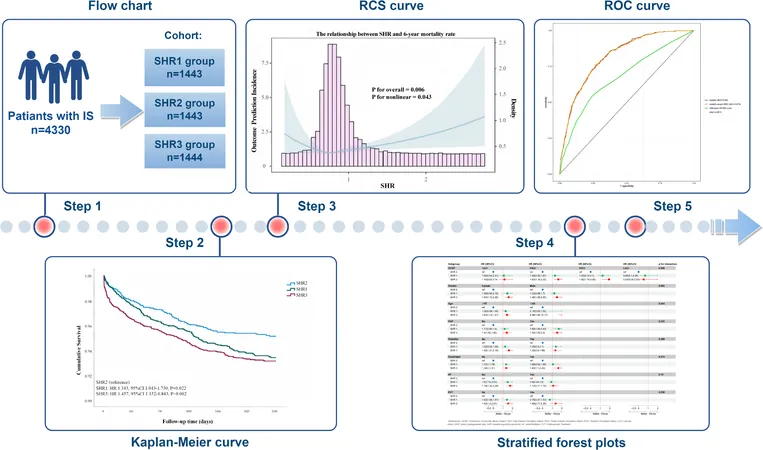
Unlocking the Secrets of Stress Hyperglycemia: A Game-Changer for Stroke Survivors?
2025-04-25
Author: Daniel
A Deep Dive into Stroke Mortality: Why SHR Matters
In a groundbreaking retrospective cohort study involving over 4,300 ischemic stroke (IS) patients from the Jiading District Central Hospital in Shanghai, researchers uncovered a critical link between stress hyperglycemia ratio (SHR) and long-term mortality outcomes. This pivotal study, conducted between January 2016 and December 2023, redefines how we view blood sugar levels in stroke patients.
Understanding SHR: The Numbers that Could Save Lives
SHR is calculated by dividing admission blood glucose levels by a factor based on hemoglobin A1c levels. Interestingly, researchers have found that both high and low SHR levels can significantly impact survival rates after a stroke. The study classified patients into three groups based on SHR tertiles, revealing alarming trends in mortality.
The Alarming Findings: SHR’s Impact on Mortality Rates
Patients in the highest SHR group (SHR3) exhibited a staggering 15.2% six-year mortality rate compared to just 8.2% in the middle group (SHR2). Besides, in-hospital mortality was also significantly higher for those with elevated SHR levels. This indicates that managing blood sugar levels effectively could be vital for improving long-term survival for stroke patients.
Unveiling the Benefits of Antiplatelet Therapy
Moreover, the study pointed out that antiplatelet and statin treatments could serve as protective factors against mortality, highlighting their potential in the therapeutic landscape for IS patients. By recognizing these connections, healthcare providers may take actionable steps to tailor treatments based on individual SHR metrics.
A Closer Look at the Data: SHRs Role in Predicting Outcomes
Statistical analysis using multivariate Cox proportional hazards models underscored SHR’s role as an independent predictor of mortality risk—even after adjusting for factors like age, sex, and pre-existing health conditions. This provides further evidence that monitoring SHR levels should be an integral part of managing post-stroke care.
Navigating the Complexities of Hyperglycemia and Stroke
Furthermore, the researchers explored the mechanisms behind these associations, revealing how elevated blood sugar levels can impair cerebral blood flow and lead to worse outcomes. Such insights could revolutionize how clinicians approach stroke management and survivor care, particularly in highly vulnerable populations.
Call to Action: The Need for Individualized Treatment Strategies
This remarkable research underscores the necessity for individualized treatment plans, critically informed by SHR levels. As strokes impose significant illness burdens, understanding and managing hyperglycemia could be the key to improving outcomes significantly.
Final Thoughts: A Glimmer of Hope for Stroke Survivors
In conclusion, this study reveals a compelling narrative about the importance of monitoring stress hyperglycemia in stroke patients and challenges us to rethink traditional approaches to post-stroke care. Could adjusting blood sugar levels be the game-changer in stroke management? Only time—and further targeted research—will tell.



 Brasil (PT)
Brasil (PT)
 Canada (EN)
Canada (EN)
 Chile (ES)
Chile (ES)
 Česko (CS)
Česko (CS)
 대한민국 (KO)
대한민국 (KO)
 España (ES)
España (ES)
 France (FR)
France (FR)
 Hong Kong (EN)
Hong Kong (EN)
 Italia (IT)
Italia (IT)
 日本 (JA)
日本 (JA)
 Magyarország (HU)
Magyarország (HU)
 Norge (NO)
Norge (NO)
 Polska (PL)
Polska (PL)
 Schweiz (DE)
Schweiz (DE)
 Singapore (EN)
Singapore (EN)
 Sverige (SV)
Sverige (SV)
 Suomi (FI)
Suomi (FI)
 Türkiye (TR)
Türkiye (TR)
 الإمارات العربية المتحدة (AR)
الإمارات العربية المتحدة (AR)